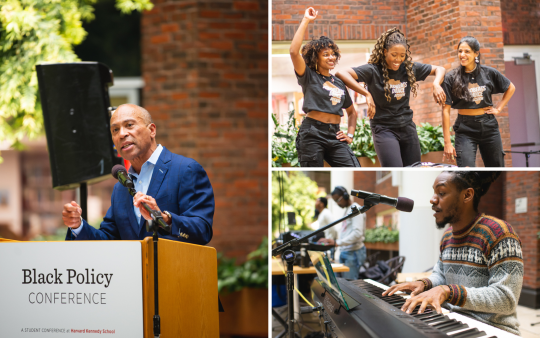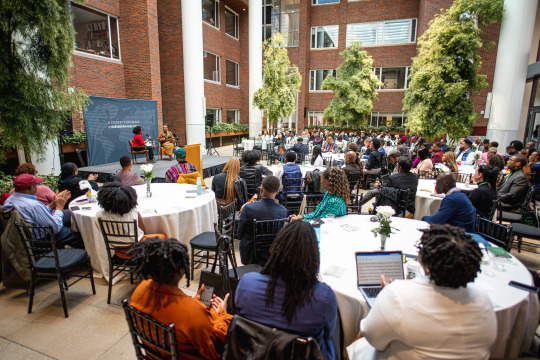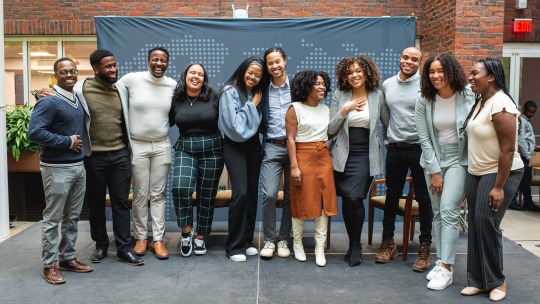Student Conferences at HKS: Black Policy Conference
Each spring, Harvard Kennedy School students organize a
series of student-led
conferences. These conferences focus on issues that are timely, relatable,
and of substance. And they’re also opportunities for our students to listen to,
learn from, and speak with thought leaders from across fields and sectors.
The annual Black
Policy Conference, held this year on Friday, March 31 and Saturday, April 1,
facilitates an open exchange of ideas around current issues affecting Black
communities globally.
The theme for this year’s Black Policy Conference was “A Modern-Day
Green Book.” Conference Co-Chair Brandon McGhee MPP 2023 explains the origin of
the theme.
“The Green Book was used in the
1900s as a tool to ensure that Black Americans could travel safely throughout
the country. It listed the gas stations, grocery stores, and hotels that Black
travelers could go and ensure that they would be safe from ‘sundown towns,’ or
places that had heightened anti-Black racism.
We chose the ‘Modern Day Green Book’
theme to focus on the safe spaces within the policy, government, and activist
arenas that enable those who are interested in advancing policies that benefit
and center the Black community to thrive and build networks with each other.”
The conference kicked off with a Jubilee Celebration on
Friday evening.
“We were able to bring in
musicians, DJs, spoken word poets, and clergy members from across the local
Boston area. Former Massachusetts Governor Deval Patrick (who
is now a faculty member at HKS) was one of our featured speakers at the event.
The celebration centered and anchored Black joy and is an event I’ll look back
on for the rest of my life,” reflects McGhee.

During the Jubilee Celebration, Governor Deval Patrick
addressed the crowd and local performers entertained the audience.
Saturday’s programming featured a variety of sessions and
panels on key topics affecting Black communities, starting with a panel on reparations.
Conference Co-Chair Mena Prince MPP 2023 says that attendees enjoyed hearing a
variety of perspectives on the subject.
“Our conference attendees enjoyed
getting to hear from those doing the work and those who are behind the
scenes making policy. The speakers engaged in a conversation about how to
go about reparations, and they discussed how these policies are playing out,
whether they are helping, and ways to do better,” says Prince.
There was also a case study session featuring community
leaders from Buffalo, New York discussing the aftermath of the 2022 mass
shooting in the city and how they crafted policies to prevent future tragedies.
“A lot of times, unfortunately,
mass killings get a lot of attention initially but then lose steam. It was
interesting to focus on what happens in the aftermath of the 24-hour news cycle
in the places that have experienced these atrocities and then how underserved
communities continue to work to make sure that the community is safe,” reflects
Prince. “It was good to hear how in this specific case, leaders were able to
take this tragedy and create sustainable change.”
The day ended with a keynote address from Cheri Beasley, the
first African American woman Chief Justice of the North Carolina Supreme Court
and a former candidate for the U.S. Senate. Beasley highlighted various ways to
engage within the political arena to make long-lasting change.

Both McGhee and Prince agree that planning the Black Policy
Conference has enhanced their HKS experiences. McGhee explains:
“I can’t imagine my HKS experience
without the Black Policy Conference. It’s been such an incredible experience
that has allowed us to development management and logistics skills and explore
leadership.
There were so many things we were
able to bring to this conference that are complementary and supplementary to
the HKS experience. HKS offers some great courses in race and racism led by
Professors Khalil
Gibran Muhammad, Cornell
William Brooks, and others, but this conference allowed us to dive into
these topics deeper. We were able to engage in in-depth conversations with
diverse communities and allies from around the globe who are passionate about
these issues.
It’s rare to be able to bring
together all kinds of people—HKS students, Black alumni, professionals,
policymakers, and activists—and provide a space for networking, building
community, and learning about new issues. Being able to bring this this
conference to life at HKS is something we’re both very grateful for.”

Black Policy Conference organizers pose for a picture.
Photo credit: Corban Swain Photography

